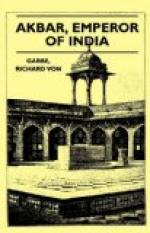[Footnote 2: A. Mueller, Der Islam
im Morgen-und Abendland, II, 300
f.]
Princes with sympathetic qualities were not entirely lacking in the seven centuries of Mohammedan dominion in India, and they shine forth as points of light from the gloomy horror of this time, but they fade out completely before the luminous picture of the man who governed India for half a century (1556-1605) and by a wise, gentle and just reign brought about a season of prosperity such as the land had never experienced in the millenniums of its history. This man, whose memory even to-day is revered by the Hindus, was a descendant of Baber, Abul Fath Jelaleddin Muhammed, known by the surname Akbar “the Great,” which was conferred upon the child even when he was named, and completely supplanted the name that properly belonged to him. And truly he justified the epithet, for great, fabulously great, was Akbar as man, general, statesman and ruler,—all in all a prince who deserves to be known by every one whose heart is moved by the spectacle of true human greatness.[3]
[Footnote 3: From the literature on Emperor Akbar the following works deserve special mention: J. Talboys Wheeler, The History of India from the Earliest Ages. Vol. IV, Pt. I, “Mussulman Rule,” London, 1876 (judges Akbar very unfairly in many places, but declares at the bottom of page 135, “The reign of Akbar is one of the most important in the history of India; it is one of the most important in the history of the world"); Mountstuart Elphinstone, History of India, the Hindu and Mahometan Periods, with notes and additions by E.B. Cowell, 9th ed., London, 1905; G.B. Malleson, Akbar and the Rise of the Mughal Empire, Oxford, 1890 (in W.W. Hunter’s Rulers of India); A. Mueller, Der Islam im Morgen-und Abendland, Vol. II, Berlin, 1887; but especially Count F.A. von Noer, Kaiser Akbar, ein Versuch ueber die Geschichte Indiens im sechzehnten Jahrhundert, Vol. I, Leyden, 1880; Vol. II, revised from the author’s manuscript by Dr. Gustav von Buchwald, Leyden, 1885. In the preface to this work the original sources are listed and described; compare also M. Elphinstone, pp. 536, 537, note 45.]
When we wish to understand a personality we are in the habit of ascertaining the inherited characteristics, and investigating the influences exercised upon it by religion, family, environment, education, youthful impressions, experience, and so forth. Most men are easily comprehensible as the products of these factors. The more independent of all such influences, or the more in opposition to them, a personality develops, the more attractive and interesting will it appear to us. At the first glance it looks as if the Emperor Akbar had developed his entire character from himself and by his own efforts in total independence of all influences which in other cases are thought to determine the character and nature of a man.




